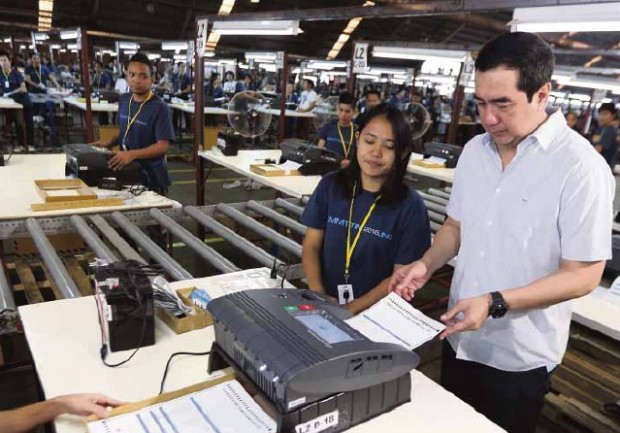
Commission on Elections Chair Andres Bautista tries out a countingmachine stored in
a Comelec warehouse in Sta. Rosa, Laguna province, during a walk-through. NIÑO JESUS ORBETA/ INQUIRER FILE PHOTO
STA. ROSA, Laguna—Postponing the May 9 elections is among the options that the Commission on Elections (Comelec) is now considering following the Supreme Court ruling ordering it to print voter receipts on Election Day.
Comelec Chair Andres Bautista said this Wednesday, reiterating what he earlier said that the timeline of the election preparations would be adversely affected by the high court decision.
Bautista, however, refused to elaborate and did not entertain questions from the media after giving a brief statement about the emergency meeting that the poll body held here with the entire Project Management Office (PMO) and the Comelec’s service provider Smartmatic International.
But in a radio interview before going into the meeting, he said: “If it needs to be postponed, then let us postpone it.”
He admitted, however, that postponing the elections cannot be done unilaterally by the commission as it will need a legislation.
“Unless otherwise provided by law, the elections will be held on the second Monday of May,” Bautista said.
“As I said earlier, this decision will materially affect our timeline. This morning, that (postponement of elections) is one of the options we are looking into and we want to know if we already need to move for the postponement of the elections,” he added.
On Tuesday, the high tribunal unanimously voted to direct the Comelec to issue receipts to voters on Election Day to serve as the voter-verified paper audit trail.
At the press conference here Wednesday, Bautista said the Comelec will hold a special en banc meeting here today for the members of the commission to decide on specific matters, such as an evaluation of their present election timetable.
The Comelec will also file a motion for reconsideration as soon as possible before the high court, he said. With the motion, the poll body will request that it be allowed to hold a vote counting machine demonstration before the high tribunal.
“What we actually want is for a chance for us to demonstrate our machines to the SC so that the justices can see for themselves how it operates, its features, and the reasons why we believe that it will be complicated or on how the disadvantages will outweigh the advantages of printing voter receipts,” he said.
Bautista said the agency is still evaluating the existing timetable and how it will be affected by the ruling.
“We are looking at what are the things we can do to enforce this directive of the SC. We want to know specifically what would be the consequences or implications if voter receipt printing is implemented,” he said.
“Specifically, we want to know the impact on our election timetable, on overseas voting, and on Election Day. We want to know how it can disrupt or be a nuisance to the process on Election Day,” he added.
To enforce the high court directive, the Comelec would have to redo the following: reconfigure more than 92,500 SD memory cards; bid out additional thermal paper stock; bid out the procurement of more than 92,500 receipt receptacles; retrain more than 277,000 election inspectors.
But the high court decision was welcomed by election watchdog groups like the Kontra Daya and the National Citizens Movement for Free Elections and even some candidates.
The Parish Pastoral Council for Responsible Voting (PPCRV) doubted that the Supreme Court would reconsider its decision.
“It’s difficult but doable. Voters will have to be obedient. The board of election inspectors and the PPCRV pollwatchers should be vigilant,” said PPCRV chair Henrietta de Villa.
Instead of grumbling about the complications, the Comelec should immediately comply with the ruling, said vice presidential candidate Sen. Bongbong Marcos.
“No matter how the Comelec feels about it, the body should immediately begin preparations in accordance with the ruling… All these practical considerations pale in comparison with the imperative to have honest and credible elections,” he said.